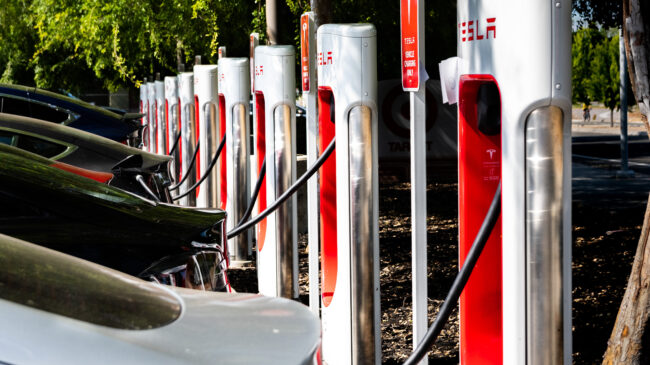For the past 20 years, transportation practitioners and researchers have known that the fuel tax was no longer a sustainable revenue source to fund the reconstruction, expansion, and maintenance of the nation’s roads and bridges. I’ve referred to the gas tax as similar to an aging rockstar on his farewell tour—the fuel tax is still around, but with the growing number of electric, hybrid, and more fuel-efficient conventional vehicles, it will soon run out of gas.
The gas tax is no longer a reliable revenue source. The federal fuel tax has lost 25% of its purchasing power in less than two decades due to vehicles with more fuel-efficient internal combustion engines becoming more commonplace on our roads. Electric cars don’t pay fuel taxes. Hybrids and fuel-efficient cars drive further on the gas taxes they pay.
With the best-selling car or truck in America— the Ford F-150 truck —now available in electric form, and top-selling cars such as the Toyota Camry and Honda Accord available as hybrids, all for less than $40,000, more fuel-efficient cars are going to be on America’s roads, and the fuel tax is going to become even less useful over the next 10 years.
The most promising replacement for the gas tax is a mileage-based user fee (MBUF), also known as a road usage charge (RUC) in some parts of the country. As the name implies, with a mileage-based user fee drivers pay for roads based on the miles they drive.
Two major national transportation research commissions have recommended replacing fuel taxes with MBUFs. Three states—Oregon, Utah, and Virginia—have already started implementing versions of permanent MBUF programs. Oregon’s program is open to all drivers. Utah’s program requires drivers of electric vehicles to pay a mileage-based user fee since they don’t pay fuel taxes. And Virginia’s program requires drivers of vehicles with Corporate Average Fuel Economy (CAFE) ratings of 25 miles per gallon or more to participate in the MBUF program or pay an additional annual fee.
Many other states, from California to New Hampshire, have conducted mileage-based user fee pilot programs. Other states plan to begin pilots in the next year. Pilot programs are the best method of determining whether MBUFs are feasible. Implementing MBUFs poses both real and perceived challenges, including collection costs, the rural vs. urban driver funding burden, privacy, and security.
As part of the Infrastructure Investment and Jobs Act (IIJA), Congress set aside $75 million over five years to continue the Strategic Innovation for Revenue Collection (SIRC) program to fund mileage-based user fee pilot programs in the states. The program requires a 20% match from non-federal entities conducting their first MBUF pilots. While $75 million is a relatively small amount of funding (compared to other federal programs), if each pilot costs approximately $2 million, the feds could fund 47 pilot programs. Some pilots will cost more, of course.
The Eastern Transportation Coalition managed a $4.5 million pilot involving nine states a few years ago. In 2017 and 2018, California conducted a multi-year pilot examining pay-at-the-pump pricing and global positioning system (GPS) technology. With the federal program, metropolitan planning organizations and local governments are also eligible, so there are new opportunities for multi-jurisdictional regional pilots within states. Therefore, while pilot program funding from the federal government is available, it is far from unlimited.
But one of the biggest problems right now is not the funding or the timeline. Some states are not seeking replacements for the fuel tax, and many are actively avoiding testing mileage fees. There are legitimate debates and concerns over whether a mileage-based user fee is the best successor to fuel taxes, but that should strengthen a state’s resolve to conduct a thorough test program.
If MBUFs work—great, problem solved. But if they don’t, the state can move on to trying something else. Yet, instead of conducting pilot programs to find a replacement for fuel taxes, some politicians are either spreading misleading information about mileage fees or sticking their heads in the sand.
Pilot programs can show drivers and lawmakers what works and what doesn’t. It can also help get rid of misinformation. One common claim from critics of mileage fees is that the government will be able to spy on you. A state pilot program would show drivers and stakeholders that non-GPS options exist and range from calculating mileage without knowing a vehicle’s location to flat annual fees, both of which have been tested successfully by states.
By avoiding MBUF pilot programs, states are letting other jurisdictions shape how MBUFs will be implemented on a federal and state level. If mileage fees continue to be seen as the long-term, sustainable replacement for the gas tax, a series of best practices will emerge. What works in Georgia may be very different than what works in California. By conducting its own pilot program, Georgia has the chance to find what works best for the state and its drivers.
The only way to create a program that is best for your state is to give your drivers the option of participating in a test of how a mileage-based user fee program might work.
The California Air Resources Board recently voted to ban the sale of new gasoline-powered cars in 2035 and require all new cars and trucks sold in the state to be zero-emission vehicles by that year. There will undoubtedly be court battles over the mandate, but several other states are expected to follow California’s lead. “New York, Oregon, Washington state and Rhode Island officials confirmed to CNN they plan to adopt California’s rule,” CNN reported after California’s announcement.
As electric cars become more and more common, states need viable ways to replace gas taxes. Those states that don’t find replacements will fail their workers, businesses, and economies as they struggle mightily to find the money to maintain their roads.

